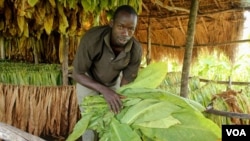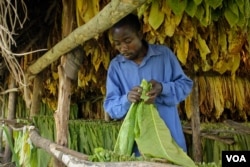The Ugandan parliament is considering a new tobacco control bill that would put strict limits on tobacco marketing and consumption. The measure is popular with health professionals, but the tobacco industry is up in arms, with small-scale tobacco farmers saying the bill will drive them out of business.
In Ahamed Mugisa’s drying shed outside Kikoboza, in the lush fields of Western Uganda, rows of brown, crinkled tobacco leaves whisper and rustle as he makes room for a fresh crop.
Mugisa has been growing tobacco for seven years, ever since his student days.
Thanks to tobacco, he said, he paid for his own education, married a wife, bought a motorbike and a cow, and now sends his two children to school.
He also grows cabbage, but he said tobacco is his best crop because it enjoys a ready market and a stable price. This, he said, lets farmers like him plan for the future.
Regulating cash crop
But for Ugandan tobacco farmers, the future is less certain than they thought. The Tobacco Control Bill currently before parliament proposes strict limits on marketing and consumption, banning smoking in and around public buildings. It also prohibits advertising tobacco products, or even displaying cigarettes in shops.
Several neighboring countries have similar laws. Member of Parliament [MP] Chris Baryomunsi, the author of the bill, said these measures are in no way extreme.
“The bill is not intended to ban the growing of tobacco. The bill does not ban smoking. The bill does not curtail the operations of the tobacco industry. But rather, it puts in place a framework for regulation,” he said.
The tobacco industry, however, is up in arms. Among those protesting in front of parliament are small-scale farmers, who argue that the bill would destroy their livelihoods.
Baryomunsi said it is big tobacco companies who are behind the protests.
“The tobacco industry, whenever this kind of legislation is initiated, they usually fight back to undermine the process," he said. "One way they do it is to incite the farmers and give them misleading information for the farmers to think that the bill is against them. This is what has happened in Uganda.”
Competing interests
But Fred Asaba, a tobacco farmer who works with Mugisa, insisted their concerns are real.
If the bill passes, Asaba argued, it will decrease demand for tobacco, which will drive down the price of the raw leaves. He said at the end of the day, it is the small farmers who will suffer.
Although it is a popular crop in his area, Moses Byenkya of the Hoima District Farmers’ Association takes a different view of tobacco.
“It’s not good. It’s labor-intensive -- it takes actually 90 percent of your time, which means you will have problems with food for home consumption. Worst of all, after selling tobacco you go to start buying food using the money that you have from tobacco. You have to go and buy from those people who grow food," said Byenkya.
Many farmers, he said, are lured into growing tobacco by the incentives offered by companies, including agricultural inputs and high-interest loans. He said if the bill passes, it might encourage farmers to look for alternatives that would ultimately benefit them more.
Even Mugisa knows there is a dark side to his bright-leafed crop.
The drying leaves make him cough, he said, enough so that he will not let his children near the tobacco. He also knows that smoking can eventually kill.
But if it becomes impossible to sell his crinkled brown leaves, he added, the government should find another cash crop to take its place.






